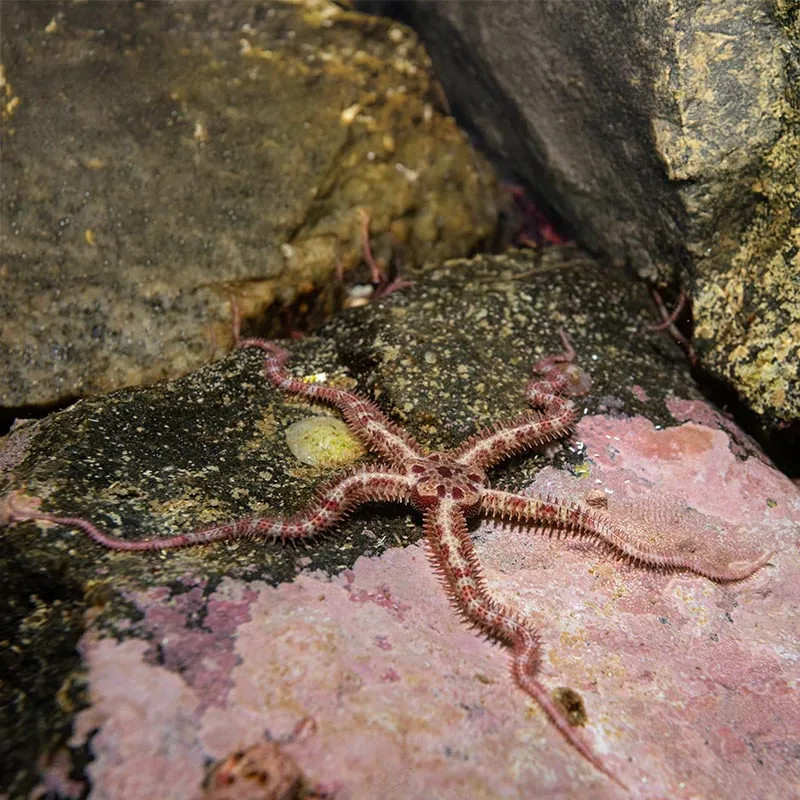Introduction
- Species: Ophiuroidea (commonly referred to as brittle stars)
- Common Names: Brittle Sea Star, Basket Star
- Natural Habitat: Found in various marine environments, including coral reefs, sandy seabeds, and rocky substrates. They typically inhabit depths ranging from shallow waters to the deep sea.
Physical Characteristics
- Appearance: Brittle stars have a central disc and long, slender arms that can be easily detached. The arms are flexible and can vary in color, often featuring intricate patterns.
- Size: Typically grows to a diameter of about 3 to 12 inches (7.5 to 30 cm), depending on the species.
- Lifespan: Can live for several years in the wild, with some species surviving over a decade in suitable conditions.
Habitat Requirements
- Tank Size: A minimum of 30 gallons is recommended to provide adequate movement and space.
- Water Conditions:
- Temperature: Prefers 72-78°F (22-26°C).
- pH: Thrives in slightly alkaline conditions, ideally around 8.1 to 8.4.
- Aquascaping: Requires plenty of hiding spots among rocks and crevices. Soft substrates are preferred for burrowing and movement.
Diet
- Primary Diet: Primarily scavengers, feeding on detritus, plankton, and small organic particles found on the ocean floor.
- Supplemental Feeding: In captivity, brittle stars may accept crushed pellets, flakes, and small pieces of seafood.
- Feeding Frequency: Generally fed a few times a week, ensuring a balanced diet to promote health.
Compatibility
- Temperament: Peaceful and non-aggressive, brittle stars often hide during the day and become more active at night.
- Suitable Tank Mates: Safe with other peaceful marine species, including small fish and invertebrates that do not pose a threat.
- Incompatibilities: Avoid housing with aggressive fish or species that nip at invertebrates, as these can stress the brittle star.
Care Level
- Difficulty: Moderate; requires stable water parameters and careful monitoring to thrive.
- Health Monitoring: Regularly check for signs of stress, such as loss of limbs or changes in coloration, which may indicate poor water quality or illness.
Breeding
- Breeding in Captivity: Rarely bred in home aquariums; most reproduction occurs in the wild.
- Spawning: Can reproduce sexually or asexually. Some species regenerate lost arms, allowing them to reproduce through fragmentation.
Economic Considerations
- Market Demand: Popular among marine aquarium enthusiasts for their unique appearance and behavior.
- Wholesale Pricing: Pricing varies by species and size, generally affordable compared to other marine invertebrates.
- Retail Pricing: Prices fluctuate based on availability and demand, typically found in the moderate price range.
Sustainability and Conservation
- Wild Population: Generally stable, but some species face threats from habitat destruction and overfishing.
- Aquaculture Efforts: Limited success in captive breeding; most brittle stars in the trade are collected from the wild.
- Conservation: Ensure that brittle stars are sourced from ethical suppliers who support sustainable practices.
Conclusion
Brittle Sea Stars are fascinating marine creatures, valued for their unique morphology and scavenging behavior. With appropriate care and habitat, they can thrive in aquarium settings, offering both aesthetic appeal and ecological benefits as part of a balanced marine environment.
